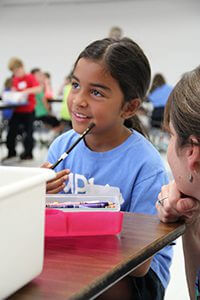September 18, 2018
 Parents are all too familiar with navigating the stress of everyday life. From getting children ready for the day and out the door in the morning, to helping with homework at night and everything in between, there is a lot to manage. As a parent, it can be easy to forget that even the youngest people in our lives can become overwhelmed and stressed. In our fast-paced world, learning to cope with challenging situations is just as important as learning how to read and write. Research has shown that mindfulness programs can help students of all ages learn to deal with everyday stress. More schools across the country are integrating mindfulness into their curricula to teach students to be present and better able to identify how they’re feeling in order to manage their stress.
Parents are all too familiar with navigating the stress of everyday life. From getting children ready for the day and out the door in the morning, to helping with homework at night and everything in between, there is a lot to manage. As a parent, it can be easy to forget that even the youngest people in our lives can become overwhelmed and stressed. In our fast-paced world, learning to cope with challenging situations is just as important as learning how to read and write. Research has shown that mindfulness programs can help students of all ages learn to deal with everyday stress. More schools across the country are integrating mindfulness into their curricula to teach students to be present and better able to identify how they’re feeling in order to manage their stress.
Mindfulness is the intentional practice of maintaining a moment-by-moment awareness of a person’s thoughts, feelings and what their body senses. It was first introduced at Mounds Park Academy two years ago. This year, students in the Lower School will be learning about mindfulness through the MindUp curriculum, a program designed specifically for educators to help young students further develop social and emotional skills. Teachers at MPA will integrate mindfulness into lessons throughout the day. Teachers will also use mindfulness strategies during transition times to help students refocus. By practicing mindfulness throughout their school day, students will learn to identify their emotions and understand why they are feeling a certain way. With a stronger understanding of their feelings, students should be able to more appropriately respond to stressful situations.
Lower School Director Renee Wright has seen firsthand the benefits of mindfulness. For her, mindfulness means being present in the moment and listening to your inner voice. “Mindfulness brings a calmness to me and helps me approach life in a more positive way,” she said. “It slows me down and allows me to appreciate the little things.”
MPA administrators chose to implement a mindfulness program in the Lower School because research has shown that early intervention and teaching children mindfulness strategies as early as PreK can have long-term benefits. Mindfulness contributes to the development of executive functioning skills such as focus, self-regulation and emotional responses. The ability to manage emotions and get along with others plays an integral role in a student’s academic and overall life success. In addition to improving physical and mental health, mindfulness has been shown to improve an individual’s entire well being.
Within our complex and ever-changing world, having the skills to manage stress is critical to being your best self. Mindfulness is a lifelong skill that requires practice in and out of the classroom but brings huge benefits to those who practice it regularly.